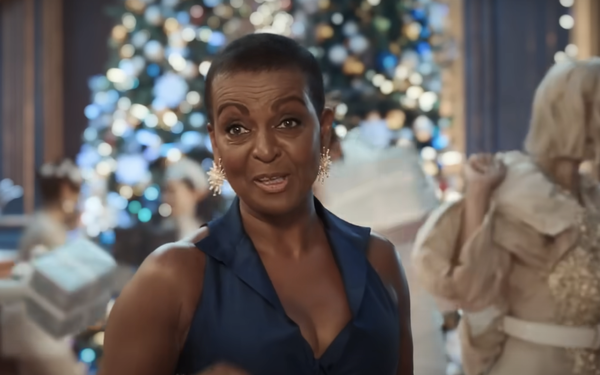
Marketing
Daily doesn’t usually weigh in on troll wars across the water -- we have enough on our hands in the U.S. But the latest U.K. round of conservative conniption fits over the Boots Christmas
ad is worth a trip around the snow globe.
The ad stars actor Adjoa Andoh, best known as Lady Danbury in Netflix’s red-hot
“Bridgerton” series. Playing Mrs. Claus and lending a hand to her snoozing spouse, she inspires the “Werkshop” to get moving, powering through the Big Guy’s list with
plenty of Boots-exclusive beauty gifts. The ad checks all the boxes for a holiday hit: Glitter, bows, sassy elves and a little marital humor.
Yet in 60 seconds, the spot manages to inflame
many different stripes of haters, and a quick spin through the right-wing rage comments is enlightening. The overt racists just hate that a Black actor can play Mrs. Clause. The Royalists, who insist
that they are not racist, say Andoh is racist because she recently remarked that the Royal family is “terribly white.” The trans-haters want to boycott Boots because Mrs. Claus
refers to someone with a “them” pronoun. A whole bunch of them seem to think her performance means Boots hates men since Santa comes off as lazy.
advertisement
advertisement
Predictably, the trolls are
calling for a boycott, using their “Go woke, go broke” rallying cry, and a few news outlets are pointing to a slight dip in Walgreens’ share price as evidence that the company is
teetering on the edge of a Bud Light moment.
That’s unlikely. While conservative furor has inflicted financial damage in a few cases -- notably Bud Light and Target in 2023 -- Boots U.K.
retail drug sales are a relatively small part of Walgreen's overall business. And Walgreens itself is such a dumpster fire, incurring billions in losses due to a series of strategic missteps, that a
few thousand crabby Brits won’t make much difference. Besides, Walgreens has been sufficiently disappointed in the 2014 Boots acquisition that the company has been exploring various plans to
unload the U.K. chain since 2022.
The risk, we think, is bigger than a swing in share price. The danger is that each “anti-woke” uproar, even if it is a tempest in a tiny Briton
teapot, is one more swing against good advertising. This kind of noise turns up the volume on self-doubt, causing teams to censor and crush good ideas before they get a chance to take root.
We’re not saying that Walgreen’s, or any brand, is saying to teams: “That’s it. No more actors of color. No queer or trans people. And absolutely no pronouns.”
They don’t have to. Every time a team member suggests casting a person of color or LGBTQ person in consumer-facing marketing, they will second-guess themselves. As ideas move up and down the
approval chain, each higher-up may ask themselves, “What if the haters come for us? Is idea x, y or z worth the risk?”
Playing it safe almost always wins. That’s why so much
of the world’s advertising is dreadful, and why so few brands break through.
We’re not the only ones worried. Some in the LGBTQ community blame inclusive ads for the conservative
backlash, not entirely in jest. Comic Wanda Sykes recently went so far as to link the recent re-election of President Donald Trump to inclusive ads. “I blame those damn Cheerio commercials,
showing all those interracial couples,” she said on a recent “Jimmy Kimmel Live.” “You scared the sh*t outta white
people. Just sell the damn cereal. Why are you bringing us into this?”
Marketers are in a terrible bind. On one hand, purpose-driven inclusive branding has been a dominant trend for
years, and market researchers point to mountains of data substantiating that today’s consumers want cause-related ads.
“But maybe sometimes that shouldn't be progress at the
expense of comfortability,” says Anna Wilgan, vice president of public relations at Kantar, which has been delving into the 2025 consumer psyche. “Maybe folks still want brands to be
inclusive and positive actors. But how that message goes to market is scrutinized because people are exhausted.”
She says there’s a tension between survival and thriving. “If
you're living paycheck to paycheck, you're not that focused on equal rights. Brands have a tricky line to walk.”
We bet more CMOs will stop trying to walk that line. Ads will look like
they used to: white Santas, subservient wives, unremarkable elves.
If creative teams aren’t careful, the haters will win more than the White House. They’ll make advertising plain
vanilla again.